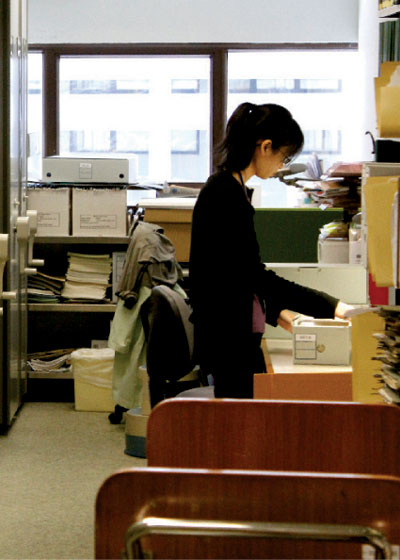Archivists ask for action, now
Updated: 2011-08-04 07:06
By Doug Meigs(HK Edition)
|
|||||||
|
An archival staff member works at the University of Hong Kong. Provided to China Daily |
|
Don Brech, former director of the Government Records Service, says archivists have long recommended archives legislation, and the need for the legislation is now urgent. Provided to China Daily |
Hong Kong's lack of archives legislation has led to frequent legal debacles, costing taxpayers millions of dollars while demonstrating the deficiency in accountable and transparent public records management. Doug Meigs reports.
A group of archivists, lawyers and historians are crusading for archives legislation in Hong Kong, in order to ensure preservation of public records, which now are held largely under the discretion of individual government departments and statutory bodies.
Chua Fi-Lan, a retired district judge and founding member of the Archives Action Group, said there are ample cases to demonstrate why the SAR urgently needs an archives law.
She cites the recent case of the Internet Learning Support Programme. A furor arose when former chief information officer Jeremy Godfrey, charged that high-level political pressure was brought to bear when it came to choosing the company that was to run the HK$220 million government-financed online learning scheme for underprivileged youth.
"During the Legislative Council inquiry, Godfrey said that Elizabeth Tse Man-yee, the permanent secretary for commerce and economic development, had told him he should set out his thinking in hard copy and hand it to her. There were no e-mails. The LegCo discovered that there was a total lack of documentation."
The Archives Action Group holds that all government meetings and transactions should be recorded and collected, with legal penalties applied to officials who fail to maintain suitable records. The group drafted a public records bill last year, holding out that stipulation, but the response was cool.
"In a situation like (the Godfrey scandal), when you have a whistle-blower, if the records are there, then you can prove that Godfrey was wrong, or you can prove that Godfrey was right," Chua said.
Internal civil service administrative guidelines require government departments to compile their own records, eventually to be collected by the Government Records Service (GRS) - the agency that maintains Hong Kong's public archives (the Public Records Office) in Kwun Tong. A GRS spokeswoman disagreed with the proposal that archives legislation is essential.
Information Officer Connie Lam answered by e-mail, when asked for an interview: "Enacting an archival law is not the only way to improve the management of government and archival records. The Government has in place administrative arrangements to facilitate the identification, transfer, and preservation of and public access to government records with historical value.
"Although there is no archival legislation in place, the existing administrative system of records management is serving its purpose and functioning effectively."
Archives laws are commonplace in many countries and regions. The United States, United Kingdom and Australia all have archives legislation. The mainland enacted its own Archives Law in 1987.
Don Brech, an Archives Action Group member and the founding director of the Government Records Service, said the department's argument does not stand. While government civil servants are expected to abide by "mandatory" guidelines, he said more than 200 governmental statutory bodies are exempt from those guidelines.
Last year, a Kowloon-Canton Railway Corp's chief officer James Blake admitted that the government-funded railway company paid "fung shui" cash settlements to at least 17 claimants in the New Territories. Government expenses amounted to HK $72 million when the company doled out money to compensate village "chi" disrupted by construction of the Hong Kong Guangzhou Express Rail Link. The South China Morning Post reported that Blake had said that the records of the payout had been "properly disposed of". Other government departments, however, claimed they also had no current record of the payments.
Brech said he is not aware of any disciplinary taken action in the case. The group's draft bill would have invoked severe sanctions, possibly imprisonment.
Chua contends that archives legislation is necessary to ensure that government officials are held accountable.
"Records insure that people behave properly. When the government has record keeping it also ensures against corruption and fraud. It's a safeguard," she said.
She cites the case of a 1976 Lantau Island development which promised to build a holiday resort including hotel and three golf courses in Discovery Bay. The private developer ran into financial trouble and sold the land. The buyer proceeded with alternative residential development plans without seeking approval of the Executive Council or paying the requisite taxes.
"When there is a change of land use, then you should pay the government. The amount of fees that should have been paid to the government was estimated to be HK$160 million," Chua said. "(The government) held an inquiry, and none of the documentation could be located. They either couldn't be found or had been destroyed. Without those documents, the government - knowing that there had been changes, seeing that there was no hotel in Discovery Bay, but lots of developed flats and houses - couldn't sue in court."
Another case involved the Hospital Authority's documentation during the SARS outbreak of 2003. Chua noted accusations of malpractice against the Hospital Authority. Many important decisions went undocumented during that crisis, leaving some charges impossible to substantiate.
"The government records services need authority to audit and inspect records, then, when they identify things that are wrong, to bring the issues to the chief executive of the department who would, under the law, have a statutory responsibility for record keeping," Brech said. Government's current approach to records management fails to account for professional archival standards, he added. Only a few professionally trained archivists have led the Government Records Service since Brech was named the first director.
Born in London, the 69-year-old Brech moved to Australia where he began his career shortly after graduating from Cambridge. He eventually moved to Hong Kong on a contract to help the colonial government prepare archival materials a decade ahead of the 1997 handover. He restructured the Public Records Office within the GRS, serving as director until his contract expired in 1991.
Brech said he recommended that the government establish an archives law in the early 1990s. "It's very difficult to know why, under the British government, there was no move to do this, because in other colonies - these would-be colonies due to become independent - they had passed ordinances relating to archives and government records," he said. "That's really an unresolved historical question. Why didn't the government decide to pursue it in Hong Kong? Maybe they saw the situation in Hong Kong, even in those early years, as rather different from other colonies."
Momentum for an archives law began to build in 2006 when the Hong Kong Archives Society commissioned the Civic Exchange, a non-partisan public policy think tank to examine the issue. Simon Chu, the president, is also a member of the Archives Action Group.
Yip Yan-yan, the chief operating officer at the Civic Exchange said that archives legislation has to compete with a long list of other political and social issues that demand government attention. The archives issue may suffer because to many observers, it may not seem as urgent. "It's always a challenge to compete for attention, but we don't want to wait until a disaster happens, when it's to late to act," Yip said.
Government departments soon will begin relocating to the Tamar site's new complex in Admiralty. Brech said that anything could be possible during such a massive relocation of vital staff and department-managed archives. Records could be discarded to make the move easier; they could be lost as a result of accidental misplacement.
Connie Lam, the information officer, said that the relevant government bodies and organizations are required "to put in place appropriate arrangements to ensure the safe custody of records and to safeguard against loss of records during relocation of their records," and the GRS has explained recommended relocation procedures.
Stacy Belcher Gould is the university archivist at the University of Hong Kong (HKU). She took the job after a 15-year career in university and museum archives in America. She said the state of archives in Hong Kong was 30 years out of date when she arrived. She has been working to build HKU's archive, essentially from scratch. "HKU realized that, as the oldest university in Hong Kong, it had a commitment to heritage that is unique among the universities here."
Gould said many people don't understand what an archive actually is.
"Archive is not only a verb meaning 'to store', it is a noun which encompasses many functions. A warehouse is not an archive."
A true archive needs trained staff working to appraise collections, preserving materials in climate controlled facilities, planning retention schedules, providing assistance to visiting researchers and a host of other duties.
Gould is a member in the Archives Action Group, and assisted in drafting the proposed archives bill.
She said her dream is for Hong Kong to pass archives legislation by the time she has secured permanent residency two years from now. She said the chances might be slim. Those in her profession are more concerned with the long term anyway.
"As archivists, we will never truly know if we've done a good job, not in our lifetimes," she said. "Those who follow 100 years, 200 years down the road will measure our success."

(HK Edition 08/04/2011 page4)

